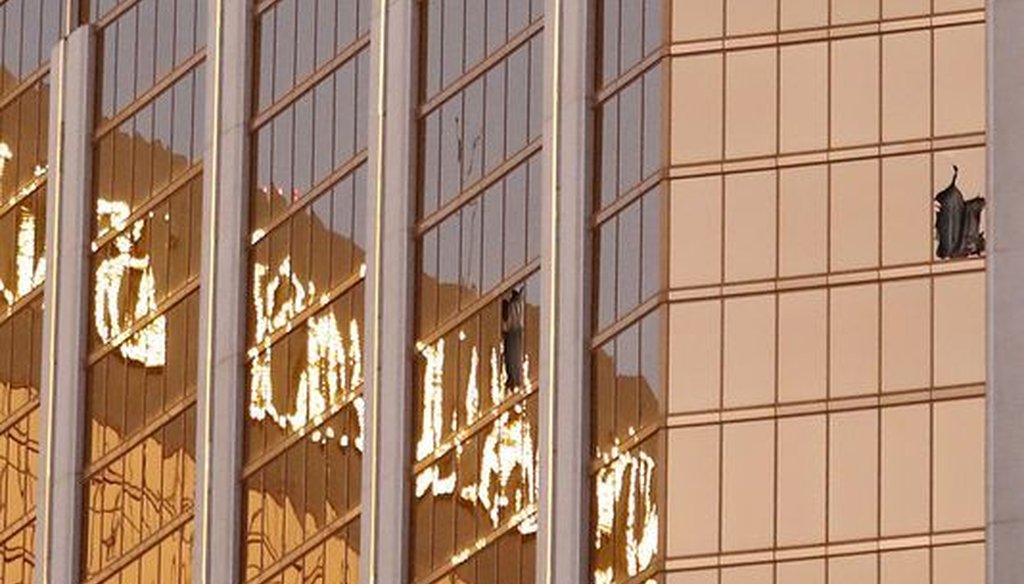Stand up for the facts!
Our only agenda is to publish the truth so you can be an informed participant in democracy.
We need your help.
I would like to contribute

Broken windows are seen on a high floor of the Mandalay Bay hotel in Las Vegas following a mass shooting on Oct. 1, 2017. (Paul Buck/EPA-EFE)
In the first hours after the Oct. 1, 2017, mass shooting in Las Vegas, many of the details — including the gunman’s mental state and motive, and any groups he might have been part of — remained unclear.
But the incident did spark a new debate about guns and gun control.
In what is being called the deadliest mass shooting in modern U.S. history, early news reports said the gunman killed more than 50 people outside of a Las Vegas casino-hotel.
Here’s a look at five fact checks we did in the wake of the June 2016 mass shooting at a nightclub in Orlando, Fla., which left 49 dead.
Ron Johnson: "Assault rifles already are banned."
The U.S. senator and Wisconsin Republican said the only weapons that are automatic — firing continuously when the trigger is held down — are assault weapons. Those are essentially prohibited by federal laws. But that definition is narrow, and Johnson’s claim gives a misleading impression of a comprehensive ban.
Lawmakers, law enforcement officials and others widely refer to many semiautomatic weapons like the rifle used in Orlando — which reload automatically but fire only once each time the trigger is depressed — as assault weapons. Those are not banned by federal law.
Paul Ryan: "People have a constitutional right to have semiautomatic rifles."
Despite the statement by the U.S. House speaker and Wisconsin Republican, the U.S. Supreme Court has not explicitly declared that Americans have a constitutional right to semiautomatic rifles. And states can, within certain parameters, put restrictions on those guns. But generally speaking, experts told us, semiautomatic rifles are a legal weapon that fall under the Second Amendment right to keep and bear arms.
Gwen Moore: "If you're a terrorist you can't fly," but "an assault weapon you can buy."
This statement was made by the Democratic congresswoman from Milwaukee.
Terrorists, as well as people deemed potential terrorists who are on the federal government’s no-fly list, are prohibited from flying. Terrorists who have a felony conviction can’t legally buy guns, but people on the government’s terrorist watchlist can, assuming they aren’t disqualified for some other reason.
Ryan: Under the current procedure, if someone "on a terror watch list" tries to buy a gun, authorities are notified.
The statement was accurate as it applied to gun sales in which a federal background check occurs. But a significant number of gun sales or other transfers lack background checks, so there would be no red flag when someone on the list tries to buy a gun.
Tammy Baldwin: The Orlando shooter used "a weapon of war."
Baldwin, a Democratic U.S. senator from Wisconsin, backed up her statement by showing that the gun used in Orlando was originally designed for military use. But that gunman had a civilian version of that gun that lacked key attributes of a military-style weapon. However, it’s also significantly different from weapons typically used by civilians for hunting.
Our Sources
PolitiFact Wisconsin items as noted




















